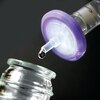ABE1959 Sigma-AldrichAnti-RAD9A Antibody
Anti-RAD9A Antibody, Cat. No. ABE1959, is a highly specific rabbit polyclonal antibody that targets RAD9A and has been tested in Immunohistochemistry (Paraffin).
More>> Anti-RAD9A Antibody, Cat. No. ABE1959, is a highly specific rabbit polyclonal antibody that targets RAD9A and has been tested in Immunohistochemistry (Paraffin). Less<<Productos recomendados
Descripción
| Replacement Information |
|---|
Tabla espec. clave
| Species Reactivity | Key Applications | Host | Format | Antibody Type |
|---|---|---|---|---|
| H, M | IH(P) | Rb | Purified | Polyclonal Antibody |
| References |
|---|
| Product Information | |
|---|---|
| Format | Purified |
| Presentation | Purified rabbit polyclonal antibody in buffer containing 0.1 M Tris-Glycine (pH 7.4), 150 mM NaCl with 0.05% sodium azide. |
| Quality Level | MQ100 |
| Physicochemical Information |
|---|
| Dimensions |
|---|
| Materials Information |
|---|
| Toxicological Information |
|---|
| Safety Information according to GHS |
|---|
| Safety Information |
|---|
| Storage and Shipping Information | |
|---|---|
| Storage Conditions | Stable for 1 year at 2-8°C from date of receipt.. |
| Packaging Information | |
|---|---|
| Material Size | 100 μg |
| Transport Information |
|---|
| Supplemental Information |
|---|
| Specifications |
|---|
| Global Trade Item Number | |
|---|---|
| Número de referencia | GTIN |
| ABE1959 | 04054839086151 |
Documentation
Anti-RAD9A Antibody Certificados de análisis
| Cargo | Número de lote |
|---|---|
| Anti-RAD9A -2767895 | 2767895 |













